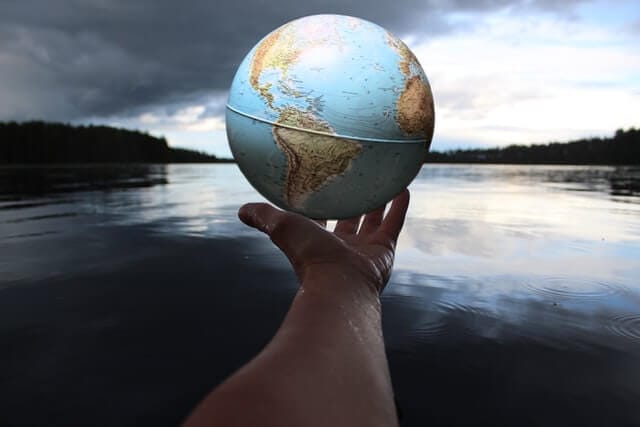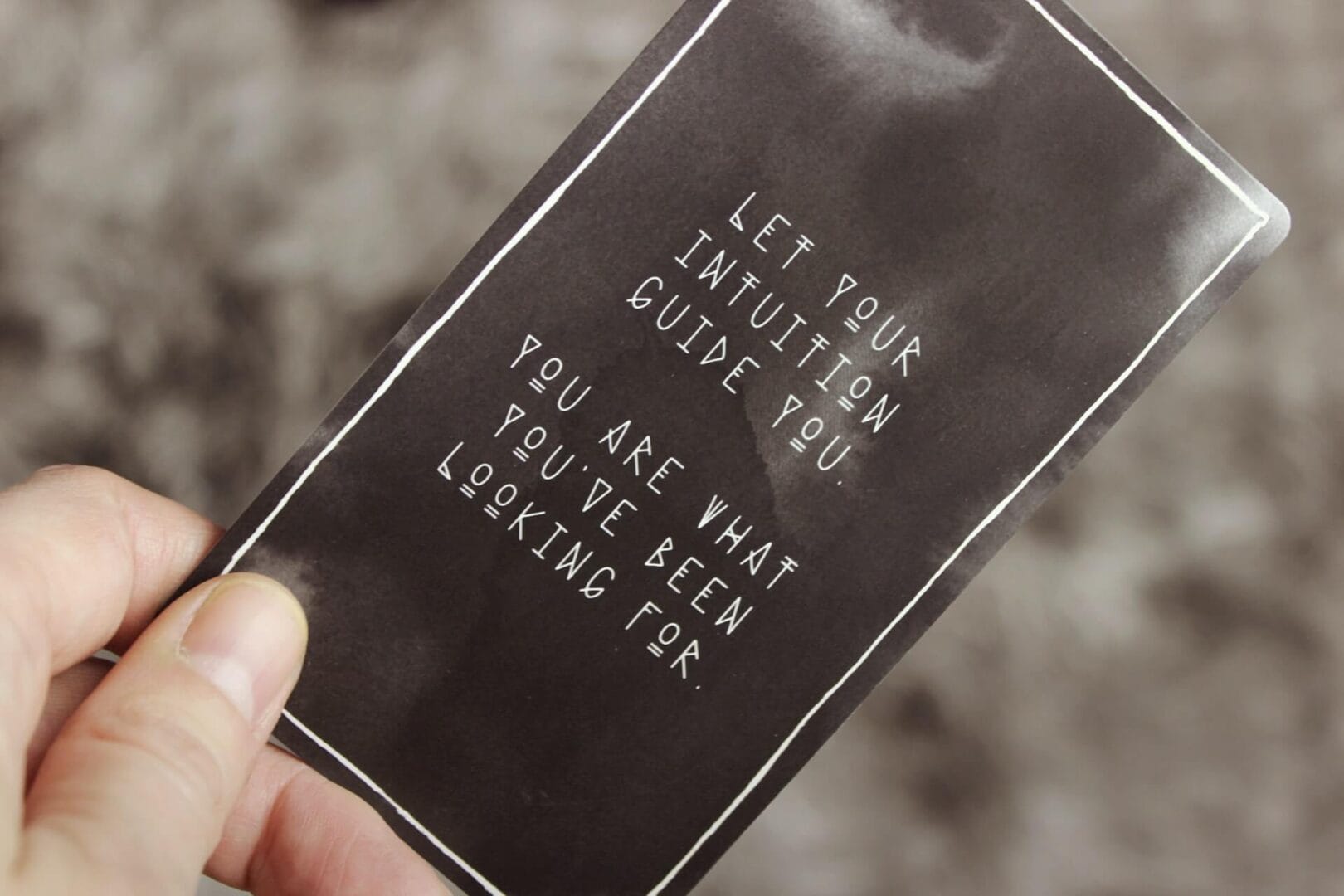Life tends to build into bigger goals and expectations as time goes by, but what…
Why is it so important for us to find purpose in our life today? How can you find purpose in your life? And what does this really mean in today’s modern world?
Today, ‘how do you find purpose in your life?’ is a question on most people’s minds, as amongst today’s generations self-awareness has evolved our desired purpose beyond the need for a secure ‘job for life’, but for whom the answer is still relatively unclear – the subject of which we look into in this article.
Why Is It Important To Find Purpose In Your Life Today?
Our hard-wired survivalistic purpose as human beings is the same as always (i.e. learn how to survive on our own two feet, find a mate and reproduce), but today many of us are in search of a deeper purpose that will also fulfill us throughout our life span, and leave a legacy beyond it.
We live a lot longer today, and our fundamental level of life quality is a lot higher on average than it was just 50-100 years ago. We are not in the times of world war, or pre-technology times of localised traditional living, where our purpose was a lot simpler, more rigid, and based purely on survival and fitting into a local community.
In one way, humans are more educated than ever about just how ‘small’ we are in comparison with the universe. We are just dust, electrical connections, and chemical elements that just formed through nothing more than luck. You could say that we are actually just insignificant.


Yet, what has this profound understanding about just how small we are in the universe actually done to us? If anything, it’s made us more determined to make something of ourselves. It makes us more aware of how short life is and how we are fortunate to even be aware enough to be able to consider our forward actions.
As science continues to unearth more about humanity and the universe around us, we find that we actually build in expectations. We want to live longer, we want to know more, we want to find some meaning in life beyond the spec of dust.
In fact, never before have humans had such high expectations placed on them. We never had to compare ourselves to the world before technology brought about an open lens to the world.
Never before did we seemingly have to compete with so many others for attention or validation. It used to be that just fitting into a local community was enough.
Today, we have such high levels of expectation and comfort that we are always searching for more. and this search for more only increases our need for our life to feel more meaningful.
If we haven’t found our ‘calling’ by the time we hit adulthood we are deemed directionless and sub-par.
In some cultures, it’s been ingrained to think of those who don’t try to climb up the ladder towards status and prestige as somewhat failures. To some ‘homeschooling’ isn’t seen as just an alternative choice, but a complete failure of parenting, such is the emphasis placed on gaining a ‘good education’ from a prestigious college so you can go and get a good job with good status.
This is an ‘orange’ thinking mindset that is actually a fairly recent phenomenon, but it’s very much ingrained in many people around the world today, deriving from the specialist need of the past 100 years or so, driven by the tech boom and global comparison and competition we now have.
Yet, through it, we have seen an even fresher, modern form of ‘green thinking’ come to be, and through this self-awareness has blossomed even further beyond simply seeking status or image as important, but finding a deeper, collective meaning in life as important. This has made us even more determined envision creating a more enriching legacy in our lives, one where we make a difference.
The Problem With The ‘Finding Your Purpose’ Ideal
We are becoming more and more ingrained by modern expectations to not just ‘make something of ourselves’, but to ‘make something substantial in the world’, and many of us now chase elusive dreams and generic visions of what we think we have to do to be collectively accepted and praised by many people we don’t even personally know (instead of our own individually-led purposes).
We idolize those who have seemingly found a popular-led purpose early and who have dedicated their whole waking hours to it. The problem here is we only see or praise the successes.
We don’t see the ones who never made it despite their efforts. We tend not to see the millions and millions of people who don’t have a platform or a presence, or who have had far greater personal challenges and triumphs that don’t get merited in a world becoming accustomed to virtue-signaling external worth over internal values.
It becomes the norm to accept that we should all do something about climate change (but then don’t follow through because it’s virtuous enough to just ‘say’ we care), but also to not even consider the more subtle and psycho-social blocks that are truly stopping the majority from reaching their potential (all the while being taught to praise those who largely didn’t have such challenges growing up).
Yet many of us don’t know what our ‘calling’ is by the time we hit adulthood. Some of us never know what it is. One day we think we like one thing, another day we like another, and we are judged that we must be more focused or that we aren’t being serious enough in our goals.
Society places such an expectation of adding something to the economy that before long our dreams and goals (that we never really had time to manifest) become secondary to the need to survive, make ends meet, raise offspring, and just fit in and be accepted and comfortable.
Before long we have forgotten all about the quest to find a purpose in our life, and we convince ourselves that it must be somehow attached to the nearest vocation we find ourselves fall into, or the latest virtue-signaling trend. Or we think it must be something we are good at and which can pay the bills.
Some read books and articles searching for hope, for get-rich-quick schemes, for insight into things we don’t know. We are curious and hopeful that it will someday lead us to find more meaning in life, but the fact is, it might, but it also might not, but when and if it does, will it even be our own directed purpose or one we are now just conditioned to think we need?
There’s those who say they woke up one day to an epiphany, that God found them, and so on.
These are people generally searching for meaning and when you do we tend to believe it finds us. The law of attraction holds merit but to truly find a purpose we really can’t expect it to just fall out of the sky.
Why? Purpose isn’t created out of thin air. Our purpose is really already around us, every single day, as we will soon see.
But before we should understand what’s driving this need to find our purpose in life more than ever.
Why We Find The Need To Seek A Deeper Purpose Than Previous Generations (There’s A Thriver In Us Somewhere)
When we travel we often think it is about finding ourselves, hoping some magical formula for life will appear and we will suddenly know what we should do.
Often we end up having a great trip full of memories, but then head back home and get on with life as we knew it before.
Why does this happen?
It’s far easier for us to just find comfort than it is to challenge that and upset our status quo. After all, we are hardwired to survive, our programmed purpose.
As far as our free will goes then beyond survival the question we are really asking is ‘how can I thrive?’.
We may all be insignificant specks of dust who barely touch on a timescale in the grand scale of time and the universe, but we are also a remarkable species that has found its way to the top of the food chain on a planet that has no evident forms of competition for potential light-years.
In that sense, we are safe and pretty much competing amongst ourselves.
We’ve since learned to be civilized on the whole and get along with humankind much better than we ever have and have advanced our quality of life so much further than ever before (despite what the naysayers and media say – they simply like to ruffle feathers as it sells more stories).
We are more comfortable than ever and because we no longer have to fight for our survival as much in our world there are many more of us who are simply searching for more value and meaning in our lives.
So, when we talk about ‘what is my purpose in life’ we instinctively look around us and upwards towards those who seemingly have found theirs. We look at those who are seemingly ‘thriving’ already.
But if we look closer we may find that this is merely an illusion, a trick vicariously living plays on us.
Not only do we only see a small fraction of a successful-looking person’s life, we assume that they are so because they tend to thrive in one area.
What about thriving in many areas?
That gets the raw deal of being called a Jack of all trades. An undecided wanderer who can’t command a big fee as they just don’t know a lot about a little. Instead, they know a little and a lot.
If we consider just how many people are asking the question ‘what is my purpose in life?’, which is probably every person who ever existed recently (even if subconsciously in many), then it’s safe to say that most haven’t found a calling in their time.
Most aren’t actually riveted with a good career in something they are good at. There’s a grass is greener complex always not far away.
And guess what. There always will be.
Why? We always want something else, something we haven’t got, as we are conditioned to fight to survive, and if we see a weakness in ourselves then we will fixate on it.
It’s actually good for our survival chances, but it’s pretty horrible for our thriving self-esteem.
So, instead, we settle and positively think ourselves to think we are worthy, that it doesn’t matter as long as we are happy. We all do it, we all find comfort zones and find coping mechanisms to avoid the fact that to thrive you need to FAIL, a lot.
Survival is about not failing, it’s about surviving. We are mostly conditioned to behave this way as less risk means higher survival chances.
How We Can Thrive And Truly Find Our Purpose In Life
If you truly want to find a purpose in life though you have to move away from this survival ideal. Thriving is where purpose is found, and isn’t just one purpose, it’s a range of purposes.
When we learn to drop this mountain-top ideal (one that says we should all be specialists who find our ‘one’ calling and keep climbing upwards in life towards it), then the more chance we have in finding multiple purposes in life.
If you are asking the questions of ‘what is my life purpose’ then you are both on the right track AND way off.
You are way off because there likely isn’t one, but you are on the right track because you are at least awake to search for the answers and to get more out of life.
Thriving is the opposite of surviving. We thrive to find more, not settle on one. It requires lots of stepping out of our comfort zone.
It takes a lot of energy that we tend to find it easier to focus on one thing. We become specialists and deem ourselves successful as society rewards us for our specialism, but guess what, we still ain’t happy.
Even those who are apparently at the top of their game can feel like they are missing something. They might not want to show it as a sign of weakness, but we all feel like we are missing something, every day, subconsciously.
And it’s not a purpose we are missing. It’s the freedom to accept that we don’t have to have one purpose.
It’s hard for us to accept though. It leaves a hole, one which our survival instincts want to fill, but that just keeps us in survival mode.
To thrive, to find more purpose in life, we actually need to be okay with just letting a defining purpose go, and to replace it with smaller daily purposes.
“Purpose is found within the freedom to accept that we don’t have to have one purpose“
In order to thrive, we have to find small dreams to follow each day, rather than a big, all-defining one.
There have been studies that show depression in people who ‘reach’ big goals. There are also studies that suggest that the anticipation of a trip creates far more electrical connections and positive emotions than the trip itself.
The trip itself is the experience that then leads into our longer-term memories, but the anticipation is where our imagination is fueled.
You see, purpose, and the ability to thrive, doesn’t come from routine and repetition. Success can, but not purpose.
Purpose comes from the ability to adapt and foster imagination. It’s the moments of flow that help define our purpose in life.
“Life simply becomes richer when you add a variety of riches to it”
We might actually not like a situation in the midst of improving at something but when we get lost in the process, whether it’s enjoyable or not, we find we can thrive rather than merely survive.
Many of us are so conditioned to be in survival mode that we seek instant gratification instead to feel good now rather than benefit later.
We do what we can to feel better and to have ‘good vibes only’. This is especially true of today’s rather pampered generation who can get all the mod-cons and gadgets at the click of a button, and at far more affordable prices than ever before.
When life is too easy to obtain something we don’t fight to survive, we sit in a comfort zone. We then need something to push us, we need to thrive at something.
But society tells us ‘thriving’ is when we do something that merits us with external rewards, so we seek more of these external rewards to give us the illusion of thriving and the illusion of fulfilling a purpose.
We know underneath though that it doesn’t really feel purposeful, so our quest continues.
Our Life Purpose Is Life And Change Itself
When does the quest stop?
It doesn’t. But when we understand that this is okay then life becomes a lot easier.
We start to fill up our time with more mini-quests of purpose rather than one. We find we can accomplish many small goals in life that add up to more rewards than one big one.
While it might seem like a blessing to know what it you want to do when you are young and follow it through, life also changes and so do our own internal expectations.
What we might have wanted to do 10 years ago likely isn’t the same now.
It’s okay to change and find something else that gives you a temporary purpose. The Renaissance Men had many purposes, the smart generalist of tomorrow does so too.
Your life simply becomes richer when you add a variety of riches to it, so don’t worry if you can’t find one specific purpose to be on this planet, you likely have many smaller purposes that provide balance and variety.
“Purpose is a moving stone, not a fixed entity”
You never fail at a purpose either, you simply move into another one. When you treat life this way, you might not become the richest person in terms of material gain (specialists are more likely to make that kind of riches as they focus on money as a sole purpose) but your life will certainly be more enriched for it.
There are many ways to enrich your day further. It’s often in how you quantify success and happiness to yourself. Is it making enough money? Doing something meaningful to help others? Learning something new?
The truth is, no one can tell you what feels purposeful to you or how exactly to find it, as it will be different for everyone. It might be one day when you decide to take up archery that it gives you a buzz that you’ve never felt before and pursue it more. Maybe one day that buzz will disappear and instead, you find it in wanting to be a detective, or in becoming a Dad (very likely).
Purpose doesn’t have to be passion either. That’s a common misconception. You don’t have to be deeply involved or in love with it forever, it can be a temporary chapter that gives you something worth focusing on for a while.
You also don’t have to quit or change your life dramatically to find something that gives you purpose.
Of course, fleeting from one job to another is hardly practical, and your job really doesn’t have to hold purpose anyway, so finding things purposeful to you is really a daily quest of giving things a try and enjoy the variety of life (getting your head out your phone is a good start) rather than the mountain-top approach to life that puts so much emphasis and expectation on finding your ideal ‘job-for-life’ or ‘purpose-for-life’.
It might be one or all of those things. You really don’t have to tick off every box each day, just acknowledge what gives you a good feeling after doing something easy or hard. Separate your purpose from expectation or work and you’ll find something finds you pretty quickly.
Find curiosity and you’ll have many purposes in life in no time!









